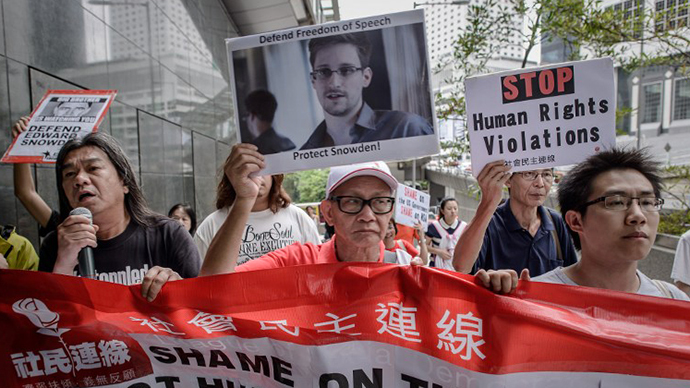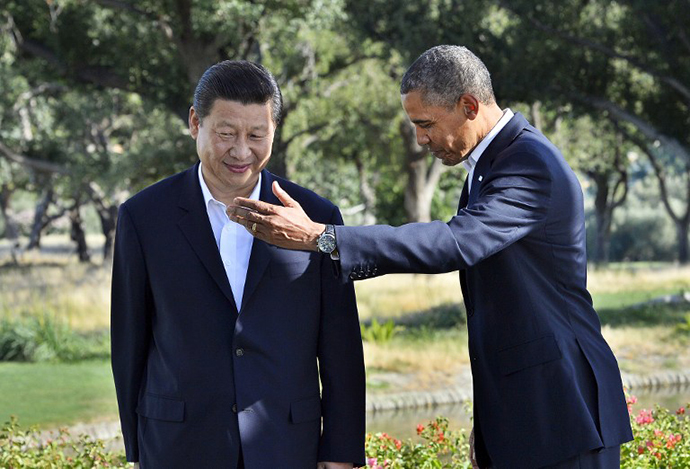http://www.zerohedge.com/news/2013-06-14/thousands-firms-trade-confidential-data-us-government-exchange-classified-intelligen
Thousands Of Firms Trade Confidential Data With The US Government In Exchange For Classified Intelligence
Submitted by Tyler Durden on 06/14/2013 00:29 -0400
The rabbit hole just got deeper. A whole lot deeper.
On Sunday we predicated that "there's one reason why the administration, James Clapper and the NSA should just keep their mouths shut as the PRISM-gate fallout escalates: with every incremental attempt to refute some previously unknown facet of the US Big Brother state, a new piece of previously unleaked information from the same intelligence organization now scrambling for damage control, emerges and exposes the brand new narrative as yet another lie, forcing even more lies, more retribution against sources, more journalist persecution and so on."
And like a hole that just gets deeper the more you dug and exposes ever more dirt, tonight's installment revealing one more facet of the conversion of a once great republic into a great fascist, "big brother" state, comes from Bloomberg which reports that "thousands of technology, finance and manufacturing companies are working closely with U.S. national security agencies, providing sensitive information and in return receiving benefits that include access to classified intelligence, four people familiar with the process said."
The companies extend far wider than the legacy telcos, such as Verizon, that launched the entire NSA-spying scandal a week ago: "Makers of hardware and software, banks, Internet security providers, satellite telecommunications companies and many other companies also participate in the government programs. In some cases, the information gathered may be used not just to defend the nation but to help infiltrate computers of its adversaries."
Many of these same Internet and telecommunications companies voluntarily provide U.S. intelligence organizations with additional data, such as equipment specifications, that don’t involve private communications of their customers, the four people said.
And since what goes on behind the scenes is confidential, literally anything goes: "Along with the NSA, the Central Intelligence Agency, the Federal Bureau of Investigation and branches of the U.S. military have agreements with such companies to gather data that might seem innocuous but could be highly useful in the hands of U.S. intelligence or cyber warfare units, according to the people, who have either worked for the government or are in companies that have these accords."
Some of the back and forth is innocuous, such as Microsoft revealing ahead of time the nature of its exposed bugs (ostensibly providing the government with a back door into any system using a Microsoft OS, but since it's don't ask, dont' tell, nobody really knows). However the bulk of the interaction is steeped in secrecy: "Most of the arrangements are so sensitive that only a handful of people in a company know of them, and they are sometimes brokered directly between chief executive officers and the heads of the U.S.’s major spy agencies, the people familiar with those programs said."
More on this "company within a company":
Typically, a key executive at a company and a small number of technical people cooperate with different agencies and sometimes multiple units within an agency, according to the four people who described the arrangements.If necessary, a company executive, known as a “committing officer,” is given documents that guarantee immunity from civil actions resulting from the transfer of data. The companies are provided with regular updates, which may include the broad parameters of how that information is used.
Remember how they say conspiracies are impossible because too many people know about them, and the information always eventually leaks? Well not if you contain it to a handful of people in any organization, and force them to sign a bloody NDA, pledging one's first born in the case of secrecy breach.
An example of a company that is happy to "communicate" with tht the government is Intel's McAfee internet security unit, which in addition to everything is one giant backdoor entrance for the government. If need be of course:
Intel Corp. (INTC)’s McAfee unit, which makes Internet security software, regularly cooperates with the NSA, FBI and the CIA, for example, and is a valuable partner because of its broad view of malicious Internet traffic, including espionage operations by foreign powers, according to one of the four people, who is familiar with the arrangement.Such a relationship would start with an approach to McAfee’s chief executive, who would then clear specific individuals to work with investigators or provide the requested data, the person said. The public would be surprised at how much help the government seeks, the person said.McAfee firewalls collect information on hackers who use legitimate servers to do their work, and the company data can be used to pinpoint where attacks begin. The company also has knowledge of the architecture of information networks worldwide, which may be useful to spy agencies who tap into them, the person said.
Google, another participant in PRISM, already lied about its participation in the covert-op:
Following an attack on his company by Chinese hackers in 2010, Sergey Brin, Google’s co-founder, was provided with highly sensitive government intelligence linking the attack to a specific unit of the People’s Liberation Army, China’s military, according to one of the people, who is familiar with the government’s investigation. Brin was given a temporary classified clearance to sit in on the briefing, the person said.According to information provided by Snowden, Google, owner of the world’s most popular search engine, had at that point been a Prism participant for more than a year.Google CEO Larry Page said in a blog posting June 7 that he hadn’t heard of a program called Prism until after Snowden’s disclosures and that the Mountain View, California-based company didn’t allow the U.S. government direct access to its servers or some back-door to its data centers. He said Google provides user data to governments “only in accordance with the law.”
Ah yes, the law that no mere mortal can observe in action, and which has zero popular checks and balances. So what specifically does Google provide to the government? "Highly offensive information" it appears.
That metadata includes which version of the operating system, browser and Java software are being used on millions of devices around the world, information that U.S. spy agencies could use to infiltrate those computers or phones and spy on their users.“It’s highly offensive information,” said Glenn Chisholm, the former chief information officer for Telstra Corp (TLS)., one of Australia’s largest telecommunications companies, contrasting it to defensive information used to protect computers rather than infiltrate them.
Going back to Obama's promise on live TV that nobody was listening in to any conversations, one wonders: why did the major telecom companies "ask for guarantees that they wouldn’t be held liable under U.S. wiretap laws." Because if the companies demanded a waiver, they obviously were wiretapping, i.e., eavesdropping, and doing so on US citizens, or those protected by US laws. And that's why Obama should have just kept his mouth shut, instead of having to explain what he meant and that he never said what he said.
Before they agreed to install the system on their networks, some of the five major Internet companies -- AT&T Inc. (T), Verizon Communications Inc (VZ)., Sprint Nextel Corp. (S), Level 3 Communications Inc (LVLT). and CenturyLink Inc (CTL). -- asked for guarantees that they wouldn’t be held liable under U.S. wiretap laws. Those companies that asked received a letter signed by the U.S. attorney general indicating such exposure didn’t meet the legal definition of a wiretap andgranting them immunity from civil lawsuits, the person said.
Ah, the US Attorney General - because what is another Obama scandal that doesn't involve his primary henchman Eric Holder...
Mark Siegel, a spokesman for Dallas-based AT&T, the nation’s biggest
phone carrier, declined to comment. Edward McFadden, a spokesman for
New York-based Verizon, the second-largest phone company, declined to
comment. Scott Sloat, a spokesman for Overland Park, Kansas-based
Sprint, and Monica Martinez, a spokeswoman for Broomfield,
Colorado-based Level 3, didn’t immediately respond to requests for
comment.
No need to comment - it's quite clear.
The last question remains: what do companies get out of this proactive betrayal of their clients? Well, in some cases, such as those of IBM and Amazon as we described yesterday, they get lucrative government (CIA) contracts for billions of dollars. But that's just taxpayer cash. Where it gets worse is when the kickbacks are yet more secrets.
In exchange, leaders of companies are showered with attention and information by the agencies to help maintain the relationship, the person said. In other cases, companies are given quick warnings about threats that could affect their bottom line, including serious Internet attacks and who is behind them.
In other words, what is going on behind the scenes is nothing more than one vast, very selective, extremely secretive, symbiotic and perfectly "legal" giant information exchange network, which allows corporations to profit off classified government information either in kind or in cash, and which allows the government to have all the information at its disposal, collected using public and private venues, in order to protect itself, to take out those it designates as targets, or simply said - to get ever bigger.
The loser in all of this?
You.
http://rt.com/news/snowden-china-extradition-secrets-689/
( Who snatches Snowden first - the US or China ? )
http://rt.com/news/snowden-china-extradition-secrets-689/
( Who snatches Snowden first - the US or China ? )
Snowden’s asset: NSA hacking exposer knows secrets China wants
Published time: June 14, 2013 09:59
Edited time: June 14, 2013 11:54
Edited time: June 14, 2013 11:54
Edward Snowden could become a valuable asset for China’s cyber security experts if he is persuaded to share the knowledge of American surveillance programs. He has already given information of alleged NSA attacks on Chinese computer networks.
The former NSA contractor is now under criminal investigation in the US over the leak to the press of details of the top-secret collection of phone and web data by the American government. He is currently in Hong Kong, a Chinese territory with a large degree of autonomy, where he claimed that the US government is engaged in massive hacking attacks on Chinese computers, some of which are key part of the country’s infrastructure.
While official Beijing has so far refrained from being dragged into the scandal, voices are rising in China calling on rejecting such a request. Popular Communist Party-backed newspaper Global Times argued that the whistleblower would be of more use to China if milked for more American secrets in a Friday Op-Ed.
“The US is accumulating all the advanced powers of the Internet to forge a state-level ‘fist’ in order to launch cyber attacks on other countries. The unparalleled power of this ‘fist’ is beyond our imagination, which should be an alarm bell for us to catch up with the development of the internet,” the newspaper argued. “Our focus should be fixed on grasping the core technology of the internet industry in the future.
Global Times added that the exposure “has demonstrated the US' hypocrisy and arrogance” over the issue of cyber warfare and that China’s rising power grants its more respect from the US. And if Beijing and the government of Hong Kong do turn Snowden over to the US, they will face a public opinion backlash, the newspaper said.
The notions have their backers among the Chinese population, notes The New Yorker. One popular comment on Chinese micro blogging service Weibo says: “If Edward Snowden was Chinese and worked for the Chinese National Security Agency, Obama probably would already have had him to dinner at the White House and nominated him for the next Nobel Peace Prize.”
Some netizens called for the extraction of information from Snowden and then for sending him off to Russia or granting him a political asylum in China as a “demonstration of state power.”
Snowden’s exposure and of US surveillance practices and appearance in Hong Kong came at an inconvenient time for diplomats in Washington and Beijing. Allegations that government-backed hackers from China are engaged in numerous acts of cyber espionage to steal America’s commercial and military secrets had been a major point of confrontation recently.
The rift seemed have been at least partially closed after the meeting between Presidents Barack Obama and Xi Jinping last week. But the allegations that the US government has been engaged in massive surveillance over foreigners and hacked into Chinese computer networks propel the issue back into spotlight.
Sweeping backbone of Chinese internet
Earlier Snowden accused American intelligence hackers of attacking at least 61,000 targets worldwide in the last four years. Many of them were located in China and are part of important infrastructure.
“We hack network backbones – like huge internet routers, basically – that give us access to the communications of hundreds of thousands of computers without having to hack every single one,”Snowden told the English-language Hong Kong newspaper The South China Morning Post.
Meeting with the Post journalists at an undisclosed location, Snowden handed them documents detailing the alleged hacking attacks, the newspaper reported. While the records cannot be independently verified, they include dates and IP addresses of Chinese computers, which were of NSA interest in the last four years.
US government hackers, according to the documents, successfully penetrated three targets in four. The sample provided by Snowden didn’t include any military targets in China and he said he didn’t know if attacks on those took place.
Among the civilian computer networks NSA hacked was Chinese University, according to Snowden. It is home to the Hong Kong Internet Exchange, a central hub of servers through which all web traffic in the city passes.
"The primary issue of public importance to Hong Kong and mainland China should be that the NSA is illegally seizing the communications of tens of millions of individuals without any individualized suspicion of wrongdoing," Snowden said. "They simply steal everything so they can search for any topics of interest."
The university said it had not detected any form of hacking of its network and that the exchange and the school's backbone network "are closely monitored round-the-clock to ensure normal operation and defend against network threats."
In addition to being a key part of Chinese internet infrastructure, the University is collaborating on a number of sensitive space-related projects.




No comments:
Post a Comment